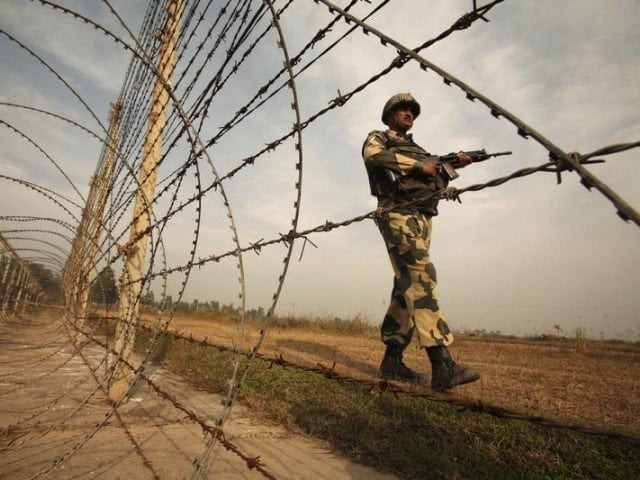Our Kashmir case
New Delhi has understandably avoided on one pretext or the other talks on the subject with Islamabad

India has been justifying the stationing of over 700,000 troops in IOK. An Indian Border Security Force soldier patrols near the fenced border with Pakistan. PHOTO: REUTERS/FILE
Currently Pakistan is facing a war-like situation on three fronts — one on the Line of Control, the other on the Durand Line and the third within from the TTP. Therefore, on its part Islamabad would not be too averse to respond positively to the desire expressed by the US. But one is not too sure if India would like to heed the advice.
India knows that any talk between India and Pakistan over Kashmir would once again internationalise the aspect of India-Occupied Kashmir’s bilateral dispute inviting global attention to the brutal suppression of a people struggling for freedom. Therefore, New Delhi has understandably avoided on one pretext or the other talks on the subject with Islamabad.
Specialised two-week courses launched for AJK college teachers
Currently or for that matter over the last 70 years Pakistan has not been as severe a headache for New Delhi as has been its forcibly-occupied part of Kashmir. More than the relevant UN resolutions, the fact that the people of IOK never accepted New Delhi’s writ at any point in time in its history and also the fact that no Indian government could so far succeed in removing Article 370 from its Constitution that recognised IOK’s separate national identity had created the required strategic space for Pakistan to encourage its non-state actors to infiltrate the occupied territory and join hands with the Kashmiri freedom fighters being maligned by India since 9/11 as Pakistani terrorists.
India has been justifying the stationing of over 700,000 troops in IOK and brutally suppressing the freedom movement all these years claiming the ‘uprising’ to be the handiwork of Pakistan. Not that the world at large accepted the Indian claim. Until the end of the Cold War with India in the Soviet camp and Pakistan being the most allied ally of the US our Kashmir case had many takers globally. Even after the Cold War and during the 1990s when jihadi infiltration from Pakistan was at its peak the world opinion would find it almost impossible to buy Indian claims.
But all this changed radically when at the end of Gen Musharraf’s Kargil misadventure our regular troops were seen withdrawing, under US pressure, from across the LoC in full public glare. Our claim that the freedom struggle going on inside the IOK was indigenous finally lost credence in the world capitals. Since then India is finding it increasingly easier to pass the blame on Pakistan for the brutalities its troops are perpetrating in IOK.
While it can avoid talking to Pakistan for decades without being held accountable by world opinion, New Delhi surely cannot dodge the Hurriyat for too long. Sooner or later India will have to negotiate a peace accord with them.
In order to create the conditions conducive to talks between India and Hurriyat, Pakistan would need to keep its hands off IOK by effectively taking care of the non-state actors. At the same time Kashmiri diaspora living in the US, UK and Europe needs to be mobilised to persuade their respective governments to convince India to talk to the Hurriyat.
To reach a lasting peace accord with the Hurriyat, India would need iron-clad guarantees from Pakistan which Islamabad would readily extend in return for a final settlement of its dispute with New Delhi.
Kashmir will be free soon: Chairman APHC
That is when the two sides could revisit with open minds the four steps of the Manmohan-Musharraf formula: 1) Demilitarisation, 2) People of Jammu and Kashmir moving freely across the LoC rendered irrelevant, 3) Self-governance without independence and 4) A joint supervision mechanism in J&K involving India, Pakistan and Kashmir.
And as part of overall settlement that would ensure lasting peace between the two nuclear neighbours, Pakistan could offer India as a trade-off land route via Pakistan to trade with Afghanistan and Central Asia and at the same time invite India to join CPEC, opening the doors for two-way trade between western China and northwestern India.
Published in The Express Tribune, March 3rd, 2018.
Like Opinion & Editorial on Facebook, follow @ETOpEd on Twitter to receive all updates on all our daily pieces.
















COMMENTS
Comments are moderated and generally will be posted if they are on-topic and not abusive.
For more information, please see our Comments FAQ